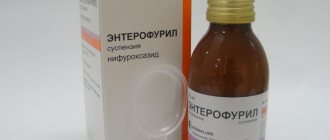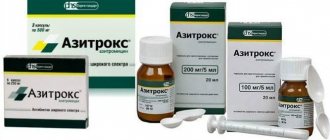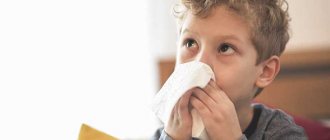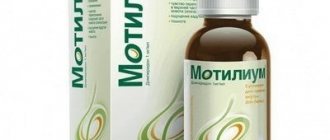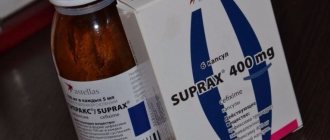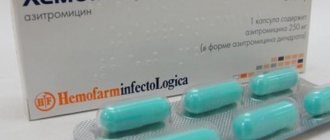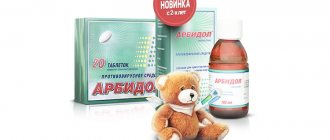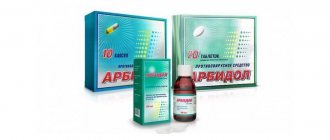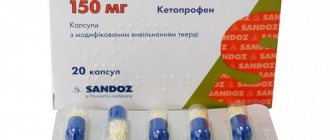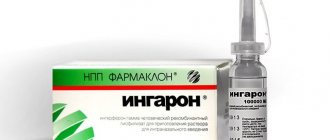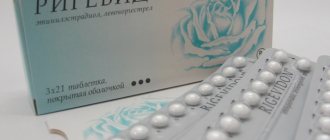- November 6, 2018
- Infectious
- ArtMaks
The child's body does not have a developed immune system and is therefore more susceptible to the effects of various bacteria. If a child develops an intestinal infection, experts often recommend using the Nifuroxazide suspension for children. The instructions position it as an effective antimicrobial agent with a wide spectrum of effects. Let's take a closer look at what is included in this drug and the features of its use in pediatric practice.
Release form and composition
- Film-coated tablets: round, biconvex, smooth, bright yellow (24 pcs. in blisters, 1 blister in a cardboard box);
- Oral suspension 4%: light yellow in color, with a sweet taste and banana smell (90 ml bottles, 1 bottle in a cardboard box complete with a measuring spoon).
Active ingredient: nifuroxazide, 1 tablet – 100 mg, 5 ml suspension – 220 mg.
Excipients of tablets: gelatin, potato starch, talc, polyethylene glycol, hypromellose, Ti dioxide, Mg stearate, Si dioxide, quinoline yellow.
Additional substances of the suspension: citric acid monohydrate, Na hydroxide, simethicone, sucrose, methylparaben, carbomer, prepared water, banana essence.
Contraindications
It should be remembered that only a doctor should prescribe a drug based on nifuroxazide after examining the patient. The drug has certain contraindications, which must be familiarized with before starting treatment.
In what cases is it prohibited to take Nifuroxazide suspension? The instructions for use indicate that this form of the drug is not prescribed to babies under two months. You should not use the drug in case of intolerance to the active substance or auxiliary components.
It is strictly forbidden to drink alcohol during treatment with the drug in question. Otherwise, the patient's condition may worsen, diarrhea and vomiting may worsen.
Pharmacological properties
Pharmacodynamics
Nifuroxazide is a 5-nitrofuran derivative and an intestinal antiseptic. It exhibits high activity against Staphylococcus spp., Campylobacter jejuni, pathogenic Vibrions and Vibrio parahaemolyticus, Vibrio cholerae, Escherichia coli, Clostridium perfringens, Shigella spp., Salmonella spp. Proteus indologenes, Enterobacter cloacae and Citrobacter spp demonstrate weak sensitivity to nifuroxazide. Microorganisms such as Pseudomonas spp., Klebsiella spp., Providencia spp. are resistant to nifuroxazide. and Proteus mirabilis.
Probably, nifuroxazide inhibits the activity of dehydrogenases and inhibits the production of proteins in bacterial cells. The substance does not lead to the emergence of drug-resistant strains. Cross-resistance with other antibacterial drugs has not been reported.
The effectiveness of the drug is determined neither by the sensitivity of microorganisms to antibacterial drugs, nor by the pH existing in the intestinal lumen. Nifuroxazide does not change the composition of the normal bacterial flora of the gastrointestinal tract, and in acute diarrhea of bacterial origin, it normalizes intestinal eubiosis. When infected with enterotropic viruses, it prevents the development of bacterial superinfection.
Pharmacokinetics
When taken orally, nifuroxazide is practically not absorbed from the gastrointestinal tract and has an antibacterial effect directly in the intestinal lumen. It is excreted in feces: 20% of the substance is unchanged, the rest is in the form of metabolites.
Nifuroxazide for children fight bacteria
Children should take two tablets of Nifuroxazide tablets once every six hours.
Nifuroxazide suspension for children can stratify greatly and become heterogeneous, so before giving it to a child, the bottle with the drug must be shaken thoroughly.
- Children aged two to six months are prescribed 110-220 mg of the drug twice a day. (110 mg suspension is approximately half a teaspoon, 220 mg is one teaspoon).
- Children aged six months to six years are prescribed 220 mg suspension three times a day.
Nifuroxazide can be given to a child at any time - both with food and between meals: this does not affect the absorption of the drug.
The only contraindication to the use of nifuroxazide is hypersensitivity or allergy to the components of the drug.
The course of treatment lasts from five to seven days.
Contact your doctor if your child's condition does not improve three days after starting treatment. You should immediately consult a doctor if the following signs appear:
- A sharp increase in body temperature;
- Vomit;
- The presence of blood and/or mucus in the child's stool;
- The appearance of symptoms of dehydration - dry lips and tongue, excretion of unusually small volumes of urine, lethargy.
How to give nifuroxazide to a small child
Giving any drug to a baby is not an easy task, because the simple and most compelling argument from an adult’s point of view: “It’s useful” does not work in this case. Here are some recommendations for parents whose children are prescribed nifuroxazide or other medications.
- While taking the medicine, the child should sit or recline so that his body is at least at an angle of 45 0 to the surface on which he is sitting. This reduces the chance of your child choking or choking.
- Place the spoon with the medicine not in the middle of the mouth, but closer to the corner of the lips. If you place it in the center, the child is more likely to choke or push the spoon and the medicine back out.
Never tell your child that medicine is candy or other treat. If it is not tasty, such deception can lead to the fact that the child will be distrustful of the words of adults for some time, waiting for an approach. If it turns out to be tasty, he may try in the future to try other medicines that he finds in the house, and the consequences of this may be unpredictable.
Don't threaten your child with punishment if he doesn't want to take the medicine, and don't raise your voice to try to persuade him - this will only make things worse. Remain calm and persist in trying to give your baby the drug - they will eventually be successful.
Side effects and precautions
Nifuroxazide is considered a safe drug for children and very rarely causes side effects. However, in rare cases, it can cause diarrhea and skin rash, which is usually a sign of an allergic reaction. The occurrence of such signs should be reported to your doctor.
Keep nifuroxazide out of the reach of children. It is best to use boxes that can be locked with a key to store medications.
If during the course of treatment you did not use all the suspension, the remainder should be thrown away. Never give nifuroxazide to other children without a doctor's prescription, even if they have the same symptoms as the child who was prescribed this drug. Remember that this medicine should only be taken if recommended by a specialist.
Indications for use
- Acute and chronic diarrhea caused by gram-positive (streptococci and staphylococci) and some gram-negative (Klebsiella, Shigella, Escherichia coli, Salmonella) bacteria;
- Toxic diarrhea caused by gram-negative bacteria (Klebsiella, Shigella, Escherichia coli, Salmonella) in children older than 2 months;
- Diarrhea in chronic autoimmune gastritis, appendicitis and food intoxication;
- Diseases accompanied by diarrhea;
- Diarrhea caused by changes in the natural bacterial flora of the large intestine of various etiologies, as well as antibiotic therapy;
- Chronic colitis and enterocolitis;
- Intestinal dysbiosis.
In addition, Nifuroxazide is used to prevent infections after abdominal surgery.
general description
Acute intestinal infections are often diagnosed in young children. Such diseases are transmitted through the fecal-oral route. That is, you can become infected with germs through unwashed hands, contaminated water, and food. The carriers of diseases are infected people. Bacteria most often enter a child’s body due to poor hygiene and sanitary standards. As a result, digestive disorders develop.
A drug such as Nifuroxazide will help the baby’s body cope with pathogenic microbes. The instructions recommend giving the suspension to children as prescribed by a specialist, because otherwise the child’s condition can only worsen. The drug is an antiseptic that has a pronounced antidiarrheal effect. To treat children, the product is used in liquid form, while tablets are suitable for adults.
Nifuroxazide is produced by several pharmaceutical companies from different countries. So, on sale you can find medicine produced in Romania, Uzbekistan, Russia or Poland. The average cost of the suspension ranges from 270-320 rubles.
Instructions for use of Nifuroxazide: method and dosage
Nifuroxazide tablets are prescribed for adults and children over 6 years old, 2 pieces. 4 times a day (every 6 hours) for 5-7 days.
In the form of a suspension, Nifuroxazide, the drug is recommended for children under 6 years of age. Dosage regimen:
- Children from 2 to 6 months: 2.5-5 ml (1/2-1 measuring spoon) 2 times a day;
- Children from 6 months to 6 years: 5 ml (1 measuring spoon) 3 times a day;
- Children over 6 years of age and adults: 5 ml (1 measuring spoon) 4 times a day.
Immediately before administration, the suspension should be shaken thoroughly (until a homogeneous mass is obtained).
Reviews
Judging by the reviews of Internet users, the use of Nifuroxazide according to indications contributes to the emergence of a high therapeutic effect. There are very few reports on the development of side effects on the forums.
Many patients mistakenly call the drug an antibiotic, but this is not entirely true. The drug belongs to nitrofuran derivatives. To the question “Which is better: Enterofuril or Nifuroxazide?” Doctors give mixed answers.
According to them, these drugs are complete analogues, and their cost is almost the same. The only advantage of Enterofuril over Nifuroxazide can be considered the variety of release forms in terms of dosage and number of tablets per package.
If you have ever taken Nifuroxazide, please leave your opinion about treatment with this drug: this will help other Internet users. To read consumer reviews about the medicine, go to the end of the article.
special instructions
When treating acute diarrhea, it is necessary to replace fluid lost by the body (parenterally or orally, depending on the patient's condition).
Nifuroxazide cannot be used as a single drug in the treatment of diarrhea accompanying sepsis, because its action is limited to the gastrointestinal tract.
During treatment, you should not drink alcoholic beverages, as there is a high probability of developing a disulfiram-like reaction.
When storing the Nifuroxazide suspension, a slight sediment may form, which after shaking should return to the state of a homogeneous suspension.
Impact on the ability to drive vehicles and complex mechanisms
Nifuroxazide does not affect the ability to drive vehicles or operate complex machinery.
Side effects
In most cases, Nifuroxazide is well tolerated by patients. However, in some cases the following adverse reactions may occur.
| Possible adverse reactions of the drug | |
| Lymphatic and hematopoietic systems | a case of granulocytopenia has been described. |
| Gastrointestinal tract | in the presence of individual hypersensitivity to the active component, abdominal pain, exacerbation of diarrhea, and nausea may occur. |
| Subcutaneous tissue, skin | Allergic reactions may develop, such as Quincke's edema, skin rash, anaphylactic reactions and urticaria. If hypersensitivity reactions develop (shortness of breath, skin rash and itching), the drug should be discontinued. |
If side effects of minor intensity occur, there is no need to discontinue the drug or use special therapy. If the intensity of these reactions increases, stop taking the drug. In this case, further intake of nitrofuran derivatives is impossible.
Overdose
There were no cases of overdose. If there is a significant excess of the dose of the drug, it is recommended to rinse the stomach. Further treatment is carried out using symptomatic therapy.
Contraindications
Nifuroxazide is not prescribed for:
- if the patient is allergic to nitrofuran derivatives or components of the drug;
- treatment of premature babies and babies under 2 months (for suspension);
- treatment of children under 6 years of age (for tablet form).
During pregnancy
Nifuroxazide is not prescribed to pregnant patients unless absolutely necessary. The medicine is used exclusively for health reasons, with a preliminary weighing of the potential risks and expected benefits.
Since there is no systemic effect of the drug, the possibility of its components passing into breast milk is minimized. From this we can conclude that the medicine can be taken during breastfeeding. Naturally, before making such a decision, you should consult your doctor.
Nifuroxazide equivalent drugs for diarrhea
The anti-diarrhea drug Nifuroxazide has several analogues. The drugs in different forms contain the same active ingredient – nifuroxazide:
- Stopdiar tablets;
- Nifuroxazide Richter – tablets and solution;
- Ecofuril and Ersefuril in capsules;
- Lecor – capsules and suspension;
- Enterofuril - capsule and liquid form.
Our specialist comments
- Parents leave positive reviews of Nifuroxazide. Mothers note the convenient form of release, which allows babies to take the medicine with pleasure, and advise other women to keep the drug in their home medicine cabinet.
- During antidiarrheal treatment, position small children so that their torso is at a 45° angle to the surface. This position will reduce the risk that a foolish child will choke or choke.
- To prevent your baby from pushing the spoon with the medicine out of his mouth, place it closer to the corner of his lips. Delivery to the center of the mouth increases the likelihood of medication failure.
The doctor tells how to treat intestinal infections in children
